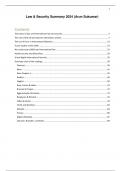Samenvatting
Law and Security Summary 2024 Arun Sukumar
- Instelling
- Universiteit Leiden (UL)
Complete Law and Security Summary from 2024, given by Prof. Arun Sukumar. Contains a summary of all lectures, course labs, and readings of the new Law & Security by Professor Sukumar.
[Meer zien]




